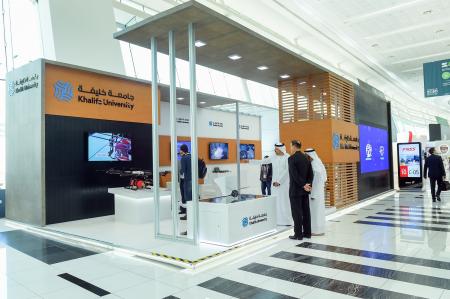Khalifa University of Science and Technology, a research university dedicated to the advancement of learning through the discovery and application of knowledge, today announced it is showcasing cutting-edge research advances in robotics and drones-related technologies at the 14th edition of the International Defense Exhibition (IDEX 2019) and the fifth edition of Naval Defense Exhibition (NAVDEX 2019) in Abu Dhabi.
Organized by (ADNEC) in collaboration with the Ministry of Defense and UAE Armed Forces, the twin events themed ‘Defense for Security and Safety’ run from 17-21 February 2019 at the Abu Dhabi National Exhibition Centre (ADNEC).
One of the projects on display at Khalifa University stand (C6-011) includes the ‘Firefighting Drone for High-Rise Buildings’ prototype – an unmanned aerial vehicle (UAV) with the capability to fight fires at high altitudes such as Burj Khalifa, the tallest building in the world at 829 meters.
Other projects include a dedicated SOC chip that can be used in a multiplicity of vision-based systems for advanced surveillance and security applications; small UAVs to provide great opportunities for diverse military, civil, and commercial applications; the MYSat-1 CubeSat developed by students of Space Systems and Technologies Concentration that was launched into orbit on 13 February by the Cygnus vehicle; and a comprehensive tool for real-time monitoring and forecasting of marine water quality in the Arabian Gulf to predict ocean currents around offshore drilling platforms, monitor pollution such as oil spills and harmful algal bloom (HAB) events, as well as provide information to help optimize the route of tankers in the Gulf.
Dr Arif Sultan Al Hammadi, Executive Vice-President, Khalifa University of Science and Technology, said: “Our participation in IDEX 2019 and NAVDEX 2019 illustrates the extent of our advanced research for technologies that can be utilized by the civil defense, security and military sectors of the country. Our research centers focusing on aerospace, robotics, artificial intelligence, smart systems, data science; and advanced materials, strive to obtain cutting-edge solutions that can be adopted by the industry.”
“We believe participation in the twin events will strengthen our status among the government and industry stakeholders, offering an opportunity for those keen to collaborate with a world-class institution renowned for research innovation in strategic sectors,” Dr Al Hammadi added.
Khalifa University’s Aerospace Research and Innovation Center (ARIC) houses a wide range of facilities, including advanced manufacturing equipment for the cost-effective production of aerospace components, testing and characterization facilities for evaluating the properties of materials under extreme loading conditions, and advanced modeling capabilities for predicting the behavior of larger structures. The KU Center for Autonomous Robotic Systems (KUCARS) focuses on robotics for extreme environments; industrial applications; and infrastructure inspection.
Additionally, the System-on-Chip Center (SoCC) focuses on high performance, energy efficient, small form factor, and low cost electronic systems; while the Center for Cyber-Physical Systems (C2PS) focuses on cybersecurity, big data analytics and artificial intelligence, networks and communication technology, and computation architectures.




